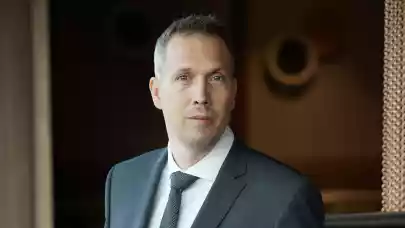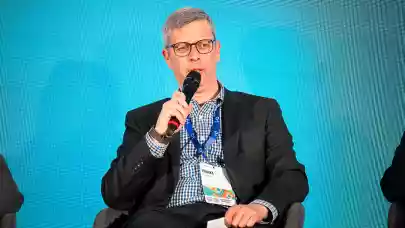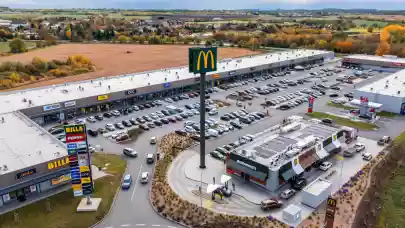
Managing retail assets was never an easy job. As the energy crisis is no longer a future problem and the recession seems inevitable, firms involved face huge challenges and have to rethink their strategy and short-term steps to survive. Property Forum asked Miklós Gyertyánfy, Chief Operating Officer at Hungary-based landlord Gránit Pólus Management Zrt. about their way to tackle those challenges.
Like all sectors in the commercial real estate business, retail faces huge challenges in making FM and PM more energy efficient. What are the major changes at Gránit Pólus?
Surging energy prices have raised questions on how tenants will be able to cover these costs. For retail units to stay financially sustainable, their real estate-related costs (rent, common area maintenance costs, energy bills) cannot exceed a certain proportion of their turnovers. This is also called the ‘occupancy cost ratio’ in the industry. During the COVID period, this ratio was challenged from the turnover side due to shop closures and buyers staying away.
Now, the challenge is from both sides of the ratio: increasing occupancy costs due to energy price increases while turnovers in the future might decrease due to recession fears (although the latter had no sign in August yet at most of our tenants). The challenge for everybody in the retail real estate industry will be soon to find the right answers to this problem. How can we help our tenants and maintain the tenant mix of our properties? Landlords have limited influence on the revenue side of tenants, especially during a recession. Efficient shopping centre marketing, digital capabilities, and a better understanding of visitors are essential.
On the other side, we must do our utmost to control the impact of surging energy bills. Short-term efforts are focused on cutting consumption immediately – in accordance with our tenants to ensure a still acceptable comfort for the visitors. In the mid-to-long term, energy efficiency investments are speeded up, which expects to curb energy bills as soon as within 6 months. Finally, we are rethinking our energy procurement strategy, potentially effective from 2024. This might include a direct agreement with a renewable energy provider.

Miklós Gyertyánfy
Chief Operating Officer
Granit Polus
Experts agree that the labour shortage is increasing day by day in FM. Does it hurt the quality of the FM services or this is somewhat manageable?
We believe that the labour market is still very stretched and finding people for labour-intensive services including security and cleaning is very difficult. There is an expectation on the market that this would ease soon due to the slowing economy, but we still feel no signs. Although our subcontractors do respect our existing agreements, we see some of them struggling to maintain the required service quality while facing faster-than-expected wage and material price increases.
Our response is to continually push subcontracts to reach a higher efficiency by optimizing manning requirements, and deployment of new technologies. Finding technical maintenance colleagues for our FM team has been a challenge for the past several years. This issue has been raised by several market participants in the past – also urging actions to support professional training and education. Our approach has been to offer a safe work environment with competitive compensation to our technical maintenance colleagues, the benefit of which has been evidenced in lower-than-average fluctuation rates.
Turning off the lights earlier or decreasing heath by one or two degrees in your properties is probably not enough. What kind of investments are preferred to cut costs in your portfolio?
Indeed. As mentioned before, focusing on the mid to long term is also our emphasis – and not just for our retail but also for office, hotel, and other assets within the Gránit Pólus portfolio. Especially since some of the energy-efficiency investments have now returns decreasing to fractions of what they were before the energy crisis. Certain even have a return period of less than a year – seemingly making them a no-brainer decision, independent of what we believe of long-term energy prices. However, there are several factors to consider here: first, the investments are on the landlord side but most of the benefits are on the tenant side (through savings in re-charged operating costs). This means that landlords also need to factor in market competitiveness gains in the return calculation.
Second, financing is limited to the source of available funds allocated for investments, which might require a re-prioritization of CAPEX projects. We are considering delaying certain non-critical projects and carrying forward all energy-related investments in our 5-year CAPEX plan. Finally, there is also a limitation on how many projects our engineering team can handle parallelly.
The most urgent energy-efficiency investment envisaged at Westend is the replacement of the air handling units. These are high energy-consuming items, which were responsible for over 50% of all electricity consumption in the common areas. Fortunately, temperature recovery technology of air handling units has developed significantly in the past years, meaning that we will be able to deploy the latest innovation. We are also investigating two other major projects: the addition of heat pumps capable of replacing gas-based heating and the installation of solar panels. The challenge with heat pumps is that the new technology would also require the replacement of fan coil units within the shopping centre. Having more than a thousand pieces of these requires significant work.
However, solar pumps would make heating independent of gas in a highly energy-efficient manner. In terms of the solar panels, our initial estimations show that more than 1MW of capacity could be placed on the surfaces of Westend, which is quite substantial compared to the 100MW of existing solar panel capacity on the roofs of Budapest today. But even this amount could only produce a small fraction of the energy needed for the property. Also, the current regulation of solar plant permitting requires the addition of energy storage capacities, which further complicates the project even though 100% of the energy produced would immediately be consumed on site. Sunshine and cooling needs of the shopping centre go hand in hand.
Service demand may change substantially and changes may occur in SLAs as a consequence. How do you think Gránit Pólus can address those changes?
We have initiated a conversation with our tenants on what would be the optimal level of energy saving while giving up partially on comfort. We are still at the beginning of this discussion. This is a quite sensitive issue in the case of the shopping centre, given that the retailers also need to estimate to what extent their buyers (and employees) will be ready to sacrifice comfort without threatening the business. I think this will be an iterative process. And I also believe that some of these changes – showing a more rational and environmentally cautious behaviour - will hopefully stay with us for good.
How would you encourage tenants to decrease their carbon footprints?
Reducing carbon footprint is part of our ESG strategy but this is also in line with the sustainability initiatives of many of our tenants. The ESG framework itself requires a conversation with the narrower and wider circle of stakeholders including tenants in order to cooperate on achieving sustainability initiatives. The first step is to jointly determine the true environmental footprint of the shopping centre, which might be followed later with joint action plans and targets for carbon footprint reduction. Optimization of logistics and encouraging shared collection points at shopping centres instead of home deliveries can be good tools.
Investing in proptech solutions may help in the battle to do your job. Which of the latest proptech innovations are used to achieve that goal?
Westend has been a pioneer in launching digital services among shopping centres. Our popular mobile application service has reached above 100,000 downloads during the past two years. We have put significant efforts into testing and introducing innovative digital solutions in the past, including robot technology and advanced data analytics. We are also regularly investing in BIM technology and FM-focused developments. We are currently working on more pilot projects with different proptech startups. One of them is about AI-enhanced speech technology on digital info screens, which can be soon tested by the visitors as well.
Going green and ESG compliance is a must in retail too. What steps were made to be a true green FM and PM service provider and a champion in terms of ESG compliance?
Although green and social responsibility-related initiatives have been part of the life at Gránit Pólus and Westend for several years, the management and the owners of the group have accepted our new ESG implementation strategy in early 2022. The group will publish its first ESG report at the end of this year. Environment-related plans are focusing on the energy efficiency of our buildings, decrease of our carbon footprint, freshwater use as well as purchasing of electricity from renewable sources. With these actions, a net carbon zero position of Westend is not unachievable in the near future. Our detailed roadmap and targets will be assessed and accepted before the end of the year. ESG is considered by us a long-term investment, which has not changed because of the current energy crisis. On the other hand, the crisis has created new opportunities in this respect – speeding up the adaptation of new environmental technologies and pushing market players towards moving much faster toward their ESG goals. A positive consequence at least.



